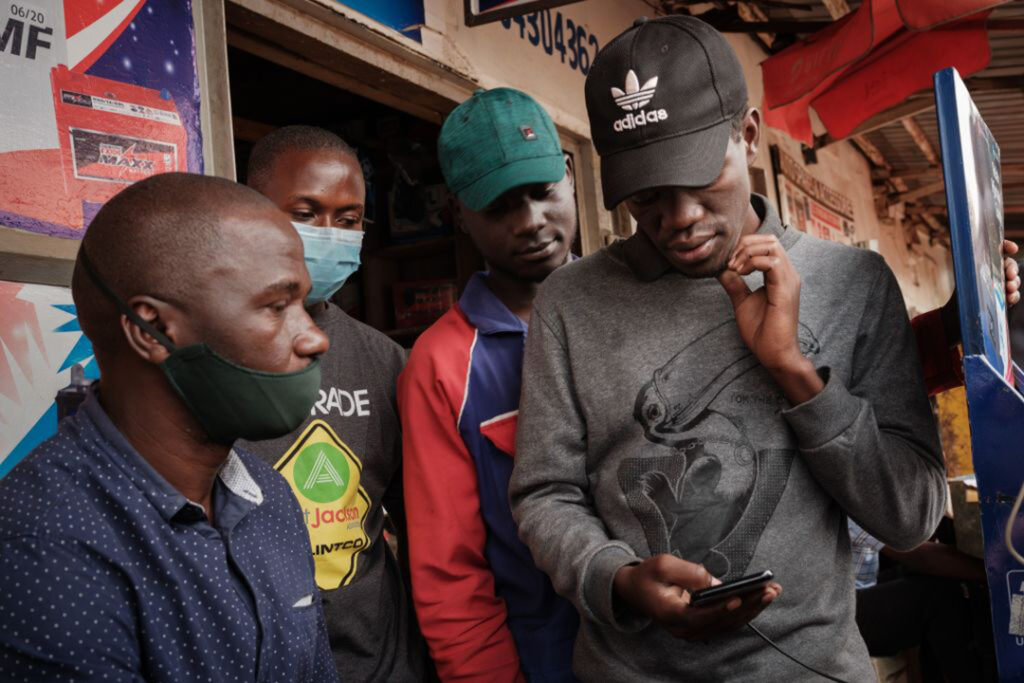ADF STAFF
Social media blackouts and internet shutdowns are increasingly common across Africa. In the past five years, at least 15 African nations have shut down the internet during elections, protests or times of crisis. Shutdowns last anywhere from days to months, causing a cascade of problems for the nations along the way.
Government officials say the blackouts are needed to preserve social order. Internet advocates call it censorship.
“Internet shutdowns during elections simply mean some African countries are unable to carry out free and fair elections,” Oluwatomiwa Ilori, a researcher with South Africa’s Centre for Human Rights, told ADF. “Shutdowns perpetuate authoritarianism.”
Consider Uganda’s preelection blackout in January.
President Yoweri Museveni was seeking a sixth term against pop singer and Parliament member Robert Kyagulanyi Ssentamu, commonly known by his stage name Bobi Wine, who had strong support among young people. The night before the country’s January 14 election, the internet went dark, shutting down the ability of Wine’s supporters to rally votes.
According to internet monitoring group Access Now, African internet blackouts grew steadily from 12 in 2017 to 25 in 2019. In 2020, other blackouts occurred in Algeria, Burundi, Chad, Ethiopia, Guinea, Somalia, Tanzania and Togo. Blackouts often were tied to protests or elections.
Although internet blackouts frequently have political roots, they create broader repercussions by shutting down commerce, education and nonpolitical communication. That is particularly true now, when the COVID-19 pandemic makes the internet essential to daily life.
In 2020, blackouts cost African nations nearly $250 million in lost economic activity, almost half of that in Ethiopia alone, according to internet advocacy group Top10VPN.
“The economic costs of an internet disruption persist far beyond the days on which the disruption occurs,” Juliet Nanfuka, digital rights analyst at the Collaboration on International ICT Policy for East and Southern Africa, told ADF. Blackouts upend supply chains and create problems that ripple throughout the economy, she said.
With a single government-owned internet gateway, Ethiopian authorities have nearly total control over their citizens’ internet access. Most recently, authorities blocked information about fighting in the Tigray region.
“Moving forward, the Ethiopian government must figure out sustainable and just solutions to the factors that cause recurrent and generational violence and trauma in the country,” Berhan Taye, senior policy analyst at Access Now, said in a statement. “Shutting down the internet is not a constructive or suitable approach to address the recurrent problems in Ethiopia.”
According to Ilori, internet shutdowns reveal the true progress specific African nations have made toward democracy.
“Internet access for many is beyond a noun — just a technology that connects,” Ilori told ADF. “It is also a verb, actively creating opportunities for political disruptions from time to time. This is what tyrannies don’t want.”
As African countries adopt Chinese communications and surveillance technology, the continent’s civil rights advocates warn they also are adopting Chinese tactics for hiding information.
A year ago, Dr. Li Wenliang became one of the world’s first known victims of COVID-19. Before that, however, he was a victim of China’s effort to hide the truth about the deadly respiratory disease that soon would spread to every corner of the globe.
On December 30, 2019, Li, an ophthalmologist in Wuhan, warned his fellow doctors in a chat group to protect themselves from the deadly respiratory illness that was spreading through his hospital.
Local authorities soon summoned Li to the Public Security Bureau and forced him to sign a statement confessing to making false statements and disturbing the social order. Li’s final post on China’s Weibo messaging service on February 1, 2020, confirmed he had COVID-19. He died less than a week later.
In the wake of his death, government censors removed online posts calling for free speech regarding public health crises, CNN reported. This may have led to fear among people about discussing the virus or spreading information.
“It is impossible to know how many people have died, or might die in the future, because people have decided to self-censor, rather than risk punishment,” wrote Paul Gardner for the website The Conversation. “The coronavirus outbreak highlights the risks of a system that puts social stability and ruling party legitimacy above the public interest.”

